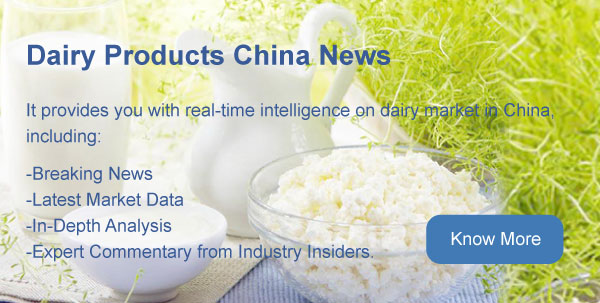Coca-Cola China is
investing in China-based premium yoghurt firm Lepur. The US beverage giant
shows with this move the dedication to take part in the booming healthy dairy
sector in China.

On
April 26, Lepur announced that it has received hundreds of millions of yuan of
investment from Coca-Cola China. The two companies agreed to work together in
product innovation, marketing channels, digitisation and brands. According to
market intelligence firm CCM, this is Coca-Cola's first investment and
cooperation with a start-up company in Asia. The drinks giant made the
investment on April 21.
According
to the announcement, Coca-Cola has acquired a 12% stake for USD38,866. This
makes the company the second largest shareholder, only being below Liu
Danni, Lepur's founder and CEO, with 35.011%.
Coca-Cola
has been trying to diversify its product portfolio to meet the new consumer
demand while in the past it wasn't able to tap into the growth of the dairy
sector, which is significantly booming in the Middle Kingdom.
The
move of Coca-Cola is reflecting the development in China’s dairy market. The
booming demand for yoghurt in China is driving the dairy investments. Premium
milk products like yoghurt have seen the biggest growth of dairy products as
consumers start to choose higher quality products.
UHT
yoghurt, in particular, is expected to witness the fastest growth of more than
20% each year, as many Chinese consumers are showing sins of lactose intolerant
and avoid purchasing milk products. In addition to this, UHT dairy products do
not need to be stored at low temperatures, allowing it to swiftly expand into
more remote areas across China.
At
present, the penetration rate of yoghurt products in China in terms of per
capita consumption remains low, compared to neighbouring Asian countries like
Japan, and South Korea. As demand increases further while household
affordability also improves, the average selling price of yoghurt could also
see room to increase ahead, as seen from a fairly steady price increase since
2010.
Selling
yoghurt is very popular for manufacturers in China since the profit margins
exceed the ones of plain milk by almost double. Currently, the profit margins
are at 40%. The high margins enable a good profitably of this business,
accounting for a big share of the total revenue for the dairy manufacturers.
By
now, the segment of yoghurt is mostly covered by Chinese firms, enjoying
high-profit margins and booming demand while facing less competition from
international players.
China’s yoghurt market
The
success of Lepur demonstrates how China’s yoghurt market is upgrading as
customers become more receptive to nutritious and healthy products despite high
prices. Rises in premium yoghurt varieties have also pushed up the average
price of yoghurt.

Sugar-free
yoghurts are still much commoner than additive-free ones, however. In April
2012, Bright Dairy & Food marketed the country’s first additive- and
sugar-free yoghurt, Rushi®, priced at USD1.3 per 135g bottle. In 2017, Pucheng
Dairy also launched a similar yoghurt at the same price. However, even
sugar-free yoghurt has not been widely accepted by consumers, so whilst healthy
foods will undoubtedly be the trend in the future, other factors such as the
trade-off with taste and indulgence, as well as price, are doubtless at play
here.
Who is Lepur?
Founded
in 2014, Lepur is one of the fastest-growing brands to have emerged as Chinese
consumers upgrade their consumption preferences. The company offers a wide
range of high-end products, including high-protein Greek yoghurt and cereal.
Lepur opened its first store in Sanlitun, Beijing's well-known expat-oriented
foodservice district.
Additive-free
yoghurt is the big selling point of the company. The basic formula of the Greek
yoghurt, called Sansansanbei®, contains only milk, sugar,
lactobacillus bulgaricus, streptococcus thermophiles
and bifidobacterium lactis. Now Lepur has developed 18 flavours by
adding different fruit bases.
At
present, Sansansanbei® is priced at USD2.4–USD3.0 per 135 g bottle, the highest
by far amongst local yoghurt. These run from about USD0.9 per 180 g for
ordinary yoghurt up to USD1.6 for the most expensive ones.
Currently,
Lepur owns 3 stores, 2 in Beijing and 1 in Chengdu. Initially, the company
mainly sold its yoghurt via its store and online, delivering only within
Beijing’s 3rd Ring Road. However, since Aug. 2015,
products brought online have been delivered nationwide. In April
2016, international hotels such as the Peninsula Hotel, Waldorf Astoria Hotel,
Rosewood Hotel and Shangri-La Hotel started to purchase yoghurt from
Lepur. From Sept. 2016, it has been selling in chain stores including 7-11,
LAWSON and Family Mart, as well as Jenny Lou's, Beijing import grocery store.
About the article
The
information for this article comes from CCM, China’s leading market
intelligence provider for the fields of chemicals, agriculture, food and feed.
Get
regular and exclusive updates in China’s dairy market by subscribing to CCM’s
monthly published China Dairy Products News.